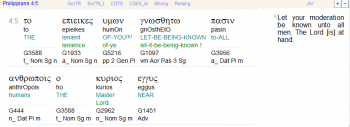Philippians 4:5
Let your moderation be known unto all men. The Lord is at hand.
View attachment 13789
LITV: Let your reasonableness be known to all men. The Lord is near.
YLT: let your forbearance be known to all men; the Lord is near;
EMTV: Let your gentleness be known to all men. The Lord is at hand.
NLT: Let everyone see that you are considerate in all you do. Remember, the Lord is coming soon.
NASB: Let your gentle
spirit be known to all people. The Lord is near.
HCSB: Let your graciousness be known to everyone. The Lord is near.
There seem to be a number of ways to translate this verse, but they all say the same thing to me.
We are conduct ourselves in such a manner that people will know that we are moderate. We control ourselves.
Moderate, reasonable, considerate, gracious, gentle, forebearing? This is to be my measure.
Much love!
Greetings Mark!
I think the word means "considerateness," speaking more of a human characteristic than a mental activity (as implied by the definition "consideration"). It is used five times in the NT, and in all five it refers to a similar characteristic in others, i.e. that they are considerate of others and their points of view. And I think this can be very important in walking in a Spirit of peace together as believers. Are we really stopping to consider what others are going through, and where they are coming from? The context was of two Christian women being at odds over some unspecified matter.
1 Therefore, my brethren dearly beloved and longed for, my joy and crown, so stand fast in the Lord, my dearly beloved. 2 I beseech Euodia and Syntyche that they be of the same mind in the Lord. 3 And I intreat you also, true yokefellow, help those women which labored with me in the gospel, with Clement also and with other my fellow-laborers, whose names are in the book of life. 4 Rejoice in the Lord always, and again I say, Rejoice. 5 Let your considerateness (of each other) be known to all men. The Lord is at hand. 6 Be anxious for nothing, but in every thing by prayer and supplication with thanksgiving let your requests be made known unto God. 7 And the peace of God which surpasses all understanding shall keep your hearts and minds through Christ Jesus.
If you look closely at the context here, it appears the two women were at odds over some decision that effected both them and maybe even the congregation there. I would have to pray for revelation on it to know, but it apparently involved one of them needing "help," as Paul suggests in the next verse his reader should give them. What kind of help? Usually this was financial help of some sort. Did one want help with a financial matter from the church, but the other was against it, thinking the money should be better spent in another way? This is where considerateness on both their parts would have been needed, and to keep in mind that the Lord was at hand, and not to lose sight that it might all be over soon anyway.
But how often is considerateness of what we are each going through as believers important? Often I'd say, and over numerous things. Even as leaders, we have different callings and visions, one having this goal and one having another.
I found this interesting on how much being "of one mind" kept coming up in Paul's letter. Apparently it was actually the major driving point in what Paul was telling the Philippians: Rejoice together and be of one mind, lest you get into strife. Whatever it was, nothing was more important than staying in peace with one another in the Spirit of the Lord Jesus Christ.
“SAME THINKING” IN PHILIPPIANS
Philippians 3:15: To think like mature Christians
“Think” (
phroneō) is a keyword in Philippians; it occurs ten times in this letter. In chapter 3, Paul has been encouraging people to have the same thinking, or attitude, as himself, that of pursuing the goal of spiritual perfection (
Phil. 3:12ff). And he writes, “as many, then, as are mature, let us think this (touto phronōmen)” (
Phil. 3:15a). It could be that Paul is carrying on this idea and, using similar language in the Greek, is saying, “I urge Euodia and I urge Syntyche to think the same thing (to auto phronein) in the Lord,” that of aspiring to spiritual maturity and perfection (
Phil. 4:2).
[1]
Philippians 2:5: To think like Jesus
Another possibility is that Paul is asking the women to have the same thinking as Jesus.
Philippians 2:5 begins with touto phroneite, literally, “you (plural) think this.” Paul wanted all the Philippians to have the same thinking—the same sacrificial, selfless and humble attitude—that was in Christ Jesus. Perhaps “the thing” Paul wants the women to think “in the Lord” is the attitude of selfless service that Jesus exemplified. Paul acknowledges that Euodia and Syntyche are his fellow workers who have served and worked hard alongside him in gospel ministry (
Phil. 4:3).
[2] He may have wanted to encourage their selfless service.
Philippians 2:2: All are to think the same thing
Paul does not just tell Euodia and Syntyche to think the same thing, however. He urges all the Philippians (literally), “that you (plural) may think the same thing (hina to auto phronēte) having the same love, united in spirit/soul, one mind . . .” And he continues, in one long sentence, to speak about humble and deferential behaviour. Paul follows up the long sentence in 2:1-4 with 2:5 where, as mentioned above, he tells the Philippians to think like Jesus, that is, have the same attitude as Jesus.
What were Euodia and Syntyche thinking?! | Marg Mowczko


